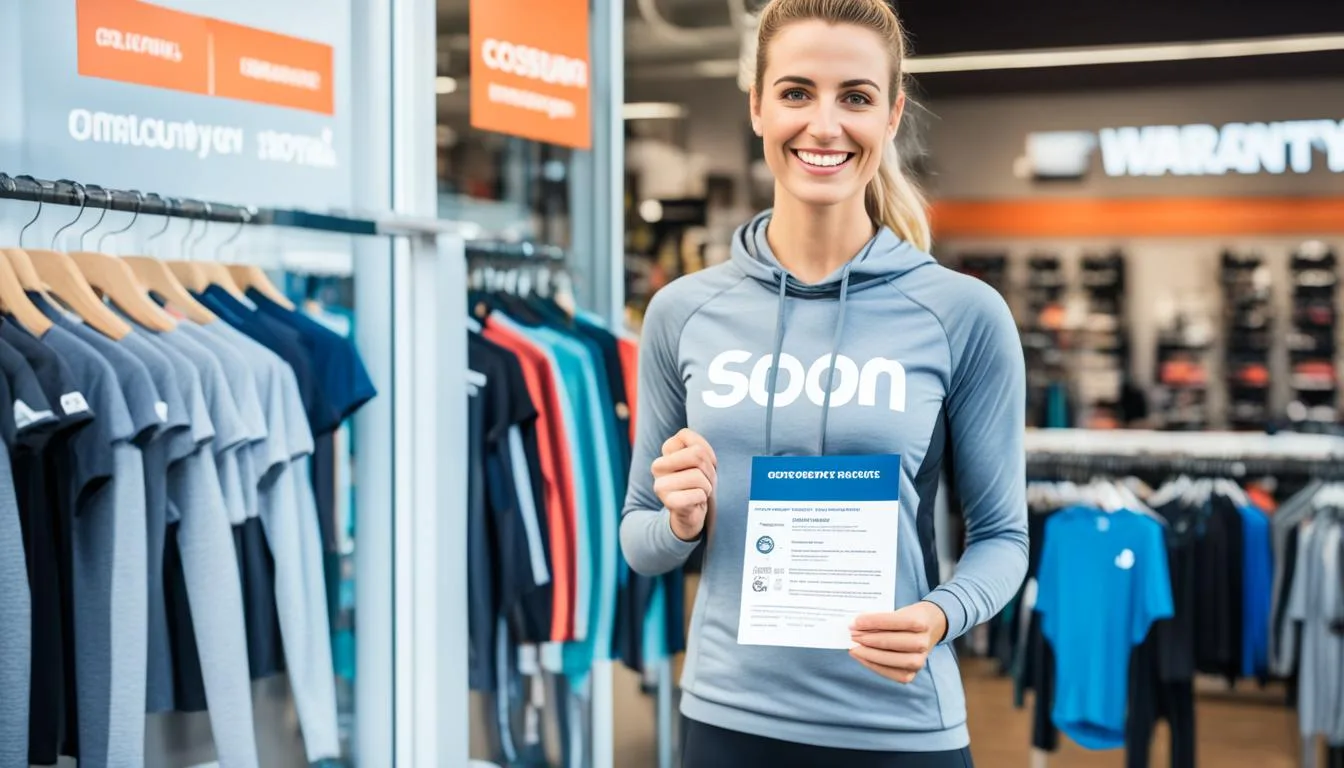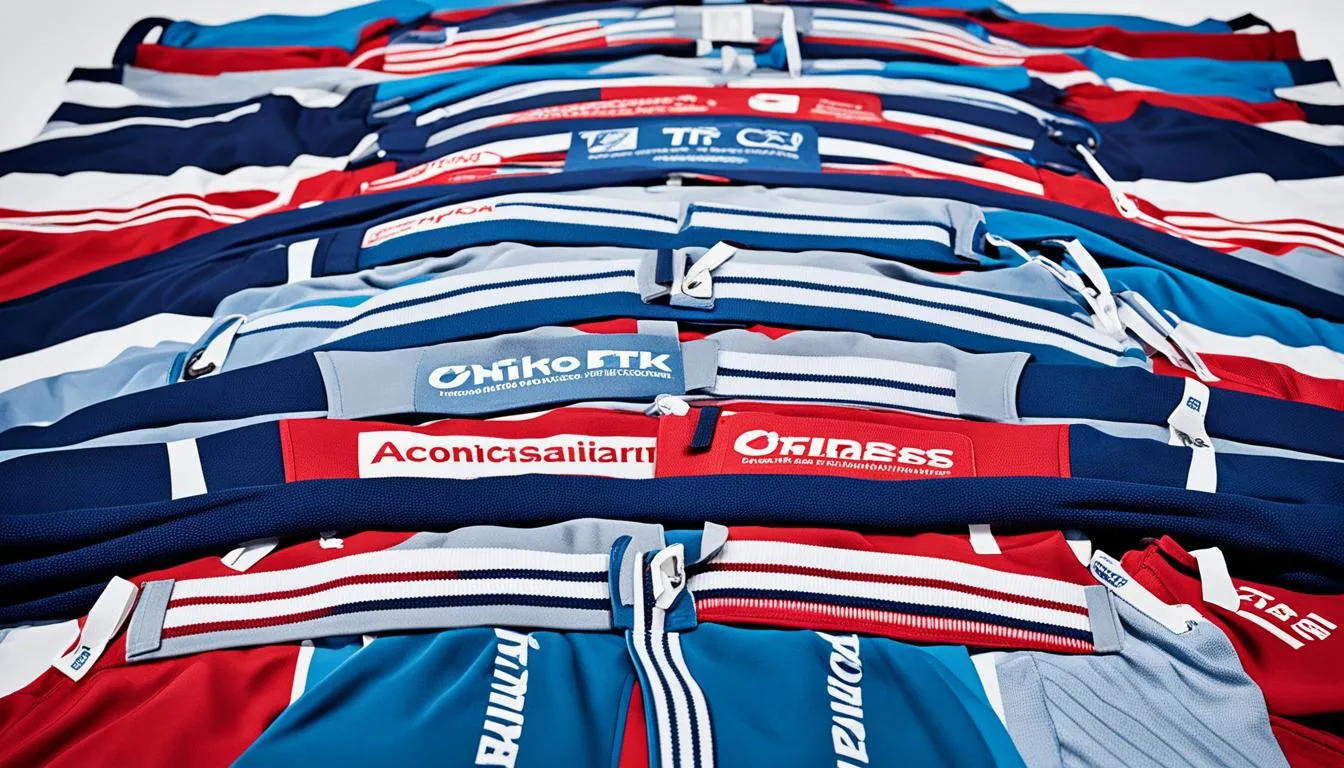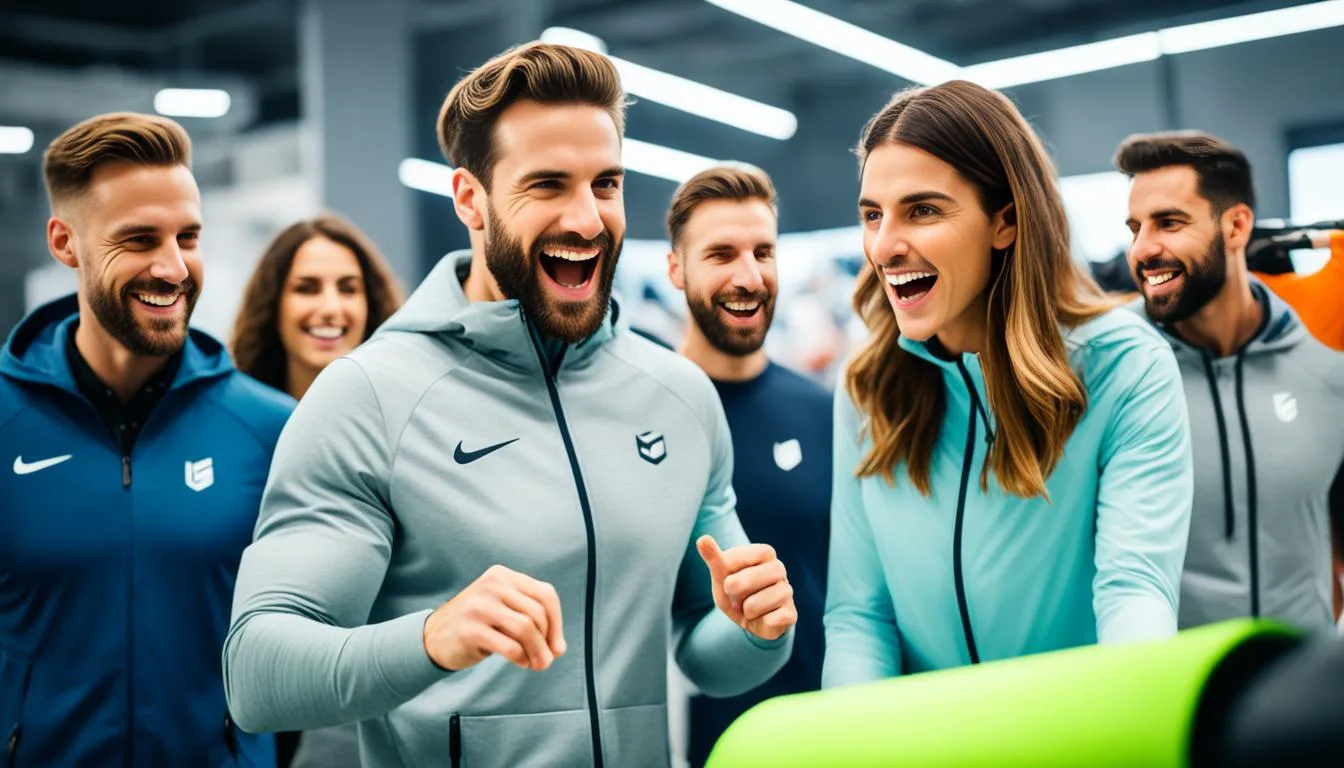The Role of Vegan Materials in Sustainable Sportswear
Connect With Us Today
Consider us for your next production run. Why wait? Send us your questions here.
The shift to sustainable practices shines a spotlight on vegan materials in sustainable sportswear. Since its launch in 2011, the Higg Index has become crucial for leading brands like H&M and Nike. They use it to carefully measure and lower fashion’s environmental impact1. Eco-friendly activewear is changing thanks to vegan fabric technology. It brings to the table eco-friendly solutions that also meet high athletic standards.
The growth of vegan materials in fashion is more than a short-lived trend. It mirrors a shift towards buying responsibly. As vegan materials become more popular, the fashion world is moving toward practices that reflect the environmentally aware buyer’s values.
Key Takeaways
- The Higg Index has become a leading standard for measuring the environmental footprint of fashion brands and retailers.
- Fostering the use of vegan materials is essential for the evolution of sustainable sportswear.
- Vegan fabric technology promotes high-performing, ethical fashion in sportswear.
- Consumer inclination towards vegan materials reflects a broader commitment to eco-friendly activewear and practices.
- The rise in vegan materials is a response to increased scrutiny and the demand for sustainability and transparency within the fashion industry.
Understanding Vegan Fabrics in Athletic Apparel
The talk about athletic apparel is changing. Vegan fabrics are now key in making clothes sustainable and environmentally friendly. More people are choosing plant-based performance wear and recycled materials for their sportswear.
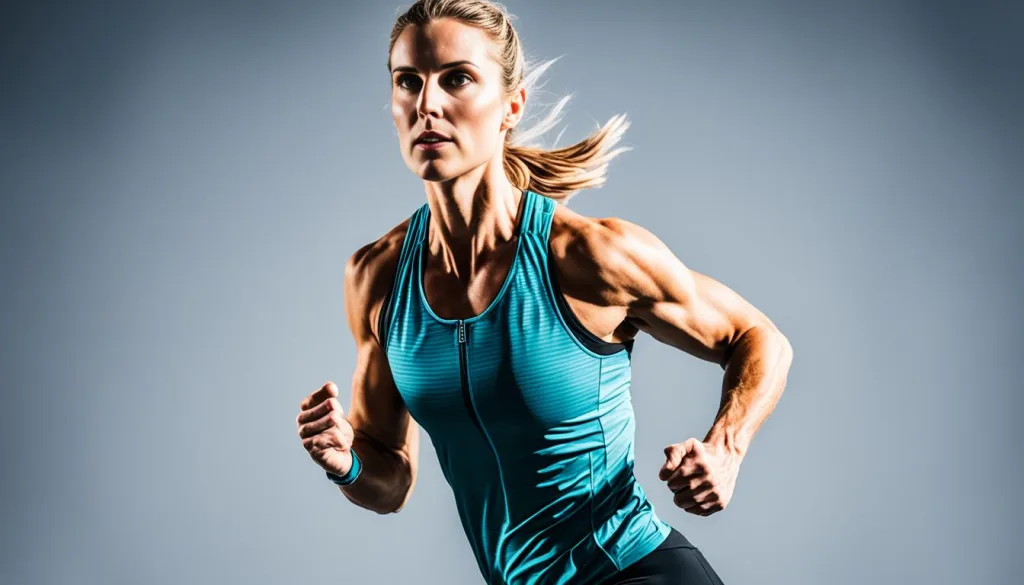
Defining Vegan Fabrics and Their Environmental Benefits
Vegan fabrics are those that avoid animal products. Recently, it was found that many brands use cotton, showing a shift to plant-based options2. Also, there’s a trend of picking synthetic clothes for tough workouts and natural ones for easier activities2.
These fabrics are not just kind to animals but good for the planet too. For instance, 13.5% of textile polyester comes from recycled bottles2. This effort helps cut down a lot of CO2 emissions every year from sportswear companies2.
The Shift from Synthetic to Plant-Based Performance Wear
Due to environmental concerns, there’s a move towards materials like hemp and organic cotton2. However, only 2% of nylon is recycled, showing a huge potential for more sustainable practices2. The Higg Index supports this shift but faces criticism over its views on synthetics1.
Yet, vegan fabrics are becoming more popular. Nearly 150 brands, including big names like H&M and Nike, are working with the Sustainable Apparel Coalition1. They’re choosing these materials, aiming to cut water use and harmful chemicals
Eco-Friendly Activewear: Beyond the Hype
The fitness world is growing, and so is the need for eco-friendly workout clothes. People care more about their impact on the planet. They prefer brands that care about the environment too.
Reducing Carbon Footprint with Sustainable Athletic Apparel
Lazy Hype leads by making sports clothes from recycled or organic materials. They even use natural dyes and ship in biodegradable packages3. Tentree also uses eco-friendly materials, offering both comfort and support3. Organic Basics uses 96% recycled materials, showing their deep commitment to the planet4.
Pact and Girlfriend Collective make clothes that are as stylish as they are green. They use recycled stuff like fishing nets. This makes them stand out for their look and their green efforts3.
How Vegan Activewear Trends Align with Ethical Consumption
Choosing green workout wear says a lot about your values. Patagonia, for example, uses recycled nylon in their shorts. This way, they make quality clothes without hurting the earth3.
Boody and Wolven take care to use materials like bamboo and recycled plastic. They focus on making the whole process green. Their clothes are also great at stopping bad odors and keeping you dry3.
| Brand | Material | Special Feature(s) | Eco-friendly Packaging | Notable Commitment |
|---|---|---|---|---|
| Lazy Hype | Recycled/Organic | Natural dyes | Biodegradable | |
| Tentree | Responsible materials | Supports all workouts | ||
| Wolven | Recycled plastic bottles | Multi-wear | Eco-friendly mailers | |
| Boody | Naturally grown bamboo | Odor-resistance, thermo-regulation | ||
| Pact | Organic cotton | Pockets | ||
| Girlfriend Collective | Recycled materials | Unitards, matching sets | ||
| Patagonia | Recycled nylon | |||
| Organic Basics | Recycled sportswear | Seamless knit collection | 96% recycled4 |
Organic Basics is doing more than making products. In 2019, they saved a lot of CO2, water, and fabric waste4. They work with CHOOOSE to further reduce carbon emissions, investing in eco projects4.
When you buy from such brands, you help the Earth. Your choice pushes the market toward greener options. This shows eco-friendly activewear is a powerful force for change, not just a trend.
The Impact of Vegan Fabric Technology on Sportswear
Vegan fabric technology is changing the sportswear industry for the better. It promotes cruelty-free materials and better performance. Thanks to innovations like Covestro’s AQUAIR® system, vegan sportswear is becoming more common. It offers both environmental benefits and better functionality for athletes. This technology uses up to 95% less water and 50% less energy compared to regular textiles, showing big environmental improvements5.
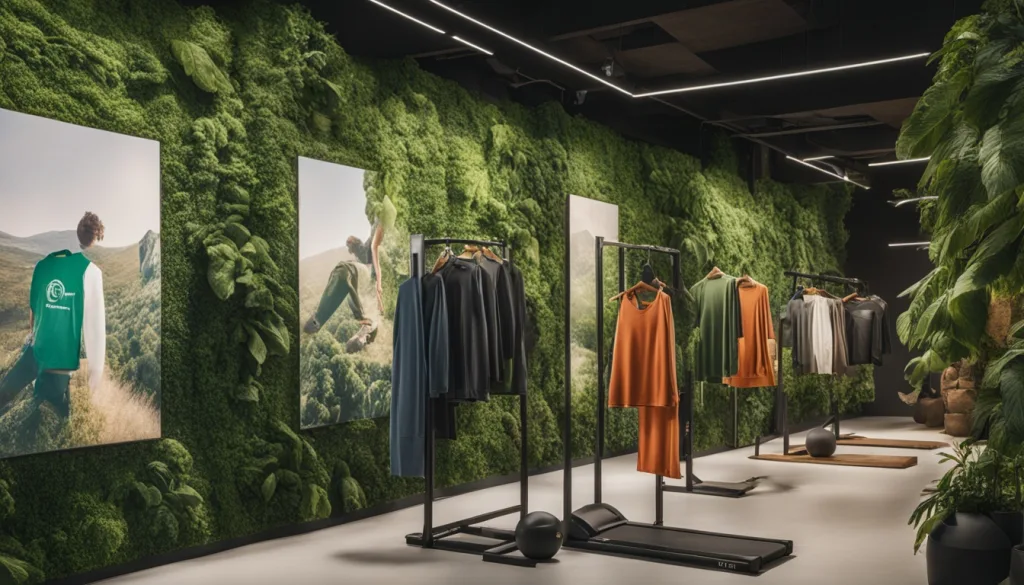
Innovations in Cruelty-Free Materials for Enhanced Performance
AQUAIR® technology is being used in various products like shoe components, sports clothing, and bags. It makes products breathable and waterproof, which means comfort for users without losing performance5. Also, INSQIN® technology helps reduce environmental damage. This move towards eco-friendly materials benefits both the planet and the consumer5.
Case Studies: Success Stories in Vegan Sportswear Development
Stella McCartney’s brand leads in ethical fashion. Her collections use 90% sustainable materials. Despite financial hurdles, her commitment to eco-friendly practices stands strong. Through the Collab SOS fund, she supports climate change solutions6. AQUAIR®’s ‘100% Vegan’ seal assures customers about its cruelty-free nature. This aligns with a movement against using animal parts in products, which saves billions of animals each year56.
In conclusion, the blend of vegan technology with sportswear isn’t just ethical. It also boosts athlete performance. Today’s innovations pave the way for sportswear that’s responsible, efficient, and high-performing. Now, technology, ethics, and performance work together seamlessly.
Championing Ethical Fashion Materials in Sports Industries
Sports industries are now choosing ethical fashion materials and focusing on social responsibility. They see the big role these elements have in building a better future. As leading brands and famous people support these green moves, sports clothing is changing globally.
Talking about ethical fashion materials is now essential in sports industries. When Naomi Campbell worked with PrettyLittleThing, it highlighted the need for better work conditions and opennessethical fashion materials7.
The Interconnection of Social Responsibility and Vegan Sportswear
Today’s shoppers want great sportswear that also does good. The fast fashion way, seen in brands like PrettyLittleThing, is being questioned. Its effects on the planet and ethical issues are big concerns7. Meanwhile, slow fashion highlights social responsibility and leans toward less waste and more sustainability7.
Brands at the Forefront of Eco-Friendly Sportswear Initiatives
Leaders in eco-friendly sportswear initiatives such as FABA, Reformation, and Amour Vert are changing the game. They are committed to sustainable materials, fair worker treatment, and classic styles7. By being open and focusing on ethical making, these brands win over customers who value taking care of our world and its people.
| Ethical Brand | Initiatives |
|---|---|
| Reformation | Carbon-neutral production and recyclable materials |
| Everlane | Radical transparency in factory operations |
| Patagonia | Conservation efforts and political activism for environmental causes |
| Amour Vert | Sustainable fibers and a planting program for every purchase |
To truly lead in eco-friendly sportswear initiatives, brands should think about a product’s whole life. This way, sports industries can satisfy today’s needs without harming our world for tomorrow’s generations.
Conclusion
Our discussion has highlighted a major shift towards vegan materials for sustainable sportswear. Agriculture uses 92% of the world’s freshwater, and the fur industry supports over a million jobs, making $40 billion a year8. It’s clear we need to think differently about fashion.
Synthetic textiles are a big problem. They add to wastewater and increase greenhouse gas emissions8. We must find greener ways to make our clothes.
Traditional cotton farming is harmful. It uses 200,000 metric tons of pesticides and 8 million metric tons of synthetic fertilizers yearly. This results in a 220 million metric ton carbon footprint8. We must adopt plant-based fibers and recycled materials to reduce this impact.
It’s crucial to keep pushing for ethical fashion. In 2018, Americans threw away 17 million tons of textile materials8. This shows we need to change how we handle clothes.
Moving to sustainable practices in making sportswear is vital. It shows our commitment to our planet and people. Every step towards this goal helps ensure a better world for future generations.
FAQ
What are vegan materials?
What are the environmental benefits of vegan fabrics in athletic apparel?
What are some examples of vegan fabrics used in performance wear?
How do eco-friendly activewear trends align with ethical consumption?
What are some innovations in vegan fabric technology for sportswear?
Which brands are leading the way in eco-friendly sportswear initiatives?
Source Links
- https://www.nytimes.com/2022/06/12/climate/vegan-leather-synthetics-fashion-industry.html
- https://www.ethicalconsumer.org/fashion-clothing/shopping-guide/ethical-sportswear
- https://vegoutmag.com/fashion-and-beauty/sustainable-activewear-brands-we-love/
- https://us.thesportsedit.com/blogs/news/organic-basics-sustainable-minimal-and-beautiful-activewear
- https://solutions.covestro.com/en/highlights/articles/cases/2023/vegan-synthetic-textile-coatings
- https://time.com/6302562/stella-mccartney-sustainability-interview-lvmh/
- https://www.scopeweekly.com/2023/09/naomi-campbell-defends-her-partnership-with-fast-fashion-brand-pretty-little-thing/
- https://www.treehugger.com/vegan-fashion-environmental-impact-5202541
Latest News
How Collaboration Shapes Consumer Preferences in Sportswear
Navigating Consumer Rights and Warranties in Sportswear Sales
Artificial Intelligence in Fashion Forecasting and Trend Analysis
The Shift Towards Inclusive Sizing in Sportswear: Consumer Reactions
The Global Expansion of Luxury Sportswear Brands
From Sketch to Gym: The Design Process of Fashionable Sportswear
Understanding the Role of Trade Associations in Sportswear Compliance
How Economic Trends Influence Consumer Spending on Sportswear
Learning from Successful Global Market Entries
Best Practices for Managing Cross-Cultural Teams
Using Technology to Fight Counterfeit Fashion Products
Carbon Nanotube Fabrics for Superior Strength and Flexibility
The Growth of Fitness Tracking Apparel in Health and Wellness
Exploring the Influence of Social Proof in Sportswear Purchasing
Strategies for Managing Compliance in a Multinational Operation
Trends in Global Footwear: Performance Meets Lifestyle
The Role of Artificial Intelligence in Tracking Supply Chain Operations
Evaluating the Success of Sportswear Collaborative Projects
Evaluating the Potential of Emerging Markets
Global Shifts Towards Gender-Neutral Sportswear
Share This Article
Latest Articles


